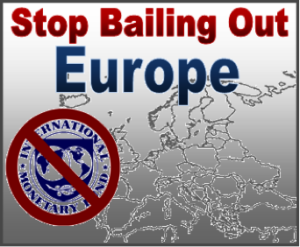
No, not in Greece, but this time in Italy and Spain. There interest rates on 10-year bonds have jumped from lows of 4.81 percent and 4.87 percent, respectively, to 5.53 percent and 5.87 percent.
Last year, rates had gotten as high as 7.26 percent in Italy, and 6.7 percent in Spain, before the European Central Bank (ECB) intervened with more than €1 trillion of kick-the-can low interest refinance loans to banks so they have the money to continue to lend to bankrupt governments.
During that time, according to the New York Times’ Liz Alderman, “Spanish banks increased their holdings of government securities by €68 billion and Italian banks by €54 billion, both buying especially debt from their own countries.”
After that, rates collapsed, but are again creeping up, this time over concerns Spain cannot control its deficits. That’s not really news. Spain had announced at the end of last year its deficit would be much larger than expected.
What’s different now is Spain did not have much debt coming due earlier this year — just €1.3 billion in Feb. — until April, when it has a full €11.9 billion to refinance. That was when the rates suddenly spiked.
For comparative purposes, Italy had €53.4 billion coming due in the first quarter, during which rates were collapsing.
This distinction has not been lost on the Italian Prime Minister Mario Monti, who last month blamed rising rates on Spain, saying, “It doesn’t take much to recreate risk of contagion… [Spain] hasn’t paid enough attention to its public accounts.”
Spanish Prime Minister Mariano Rajoy, not wishing to be singled out, then warned Italy against issuing such proclamations in a rather pathetic display.
Said Rajoy, “We hope that they assume their responsibilities and are more cautious in their statements. We don’t talk about other countries. We wish other EU and euro zone countries the best. What is good for Spain is good for the euro zone.” Indeed.
To be fair, Italy has more debt due in April as well, about €15.5 billion. So, it could just be that Monti wanted to merely shift blame to his Spanish counterpart, and legitimate pressure is being placed on Italian bond yields, too.
All of which could mean that the ECB’s long-term refinancing operations (LTRO) have run their course, and now banks once again do not have enough capital on hand to buy yet more sovereign debt.
Increased pressure could also be coming because of the concentration of sovereign risk in European banks. “Banks are lending to their governments, but not apparently to businesses,” Credit Suisse noted recently. This view was also confirmed by the ECB itself.
A credit contraction in the private sector could then compound risks in the sovereign side of the equation, creating a vicious cycle. Plus, as the UK Telegraph’s Ambrose Evans-Pritchard notes, rising rates mean banks that bought heavy doses of sovereign debt earlier this year now face tremendous losses if mark-to-market accounting is used.
The major test of the year for European bond markets — including financial institutions’ capacity to expand lending — will come in July, when Eurozone nations have more than €111.9 billion coming due for refinancing.
So, how to explain rising rates in Italy and Spain in the past month?
Perhaps, we are finally faced with a true private bond auction, where the ECB’s easy money is not playing a role, and rates are naturally rising due to market forces. Time will tell if in July, the ECB and the rest of the world bank cartel crank out another €1 trillion to buy worthless debt.
Then we will find out if these banks stuffed to the gills with sovereign debt are just zombies or not. More than likely, the ECB will again intervene with more cheap money — proving beyond any doubt these governments are bankrupt, and so are the banks that fund them.
So, no matter if you say arriverderci or hasta mañana, it’s still goodbye — to the hopes that the European contagion would not spread beyond Greece.
Bill Wilson is the President of Americans for Limited Government. You can follow Bill on Twitter at @BillWilsonALG.







